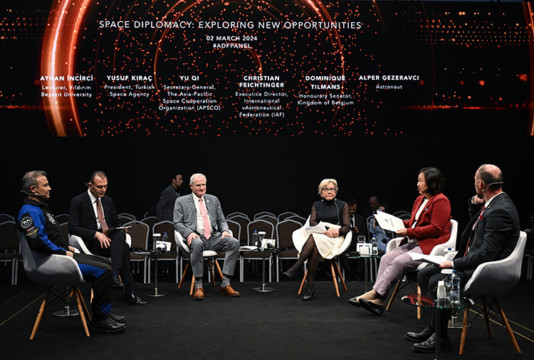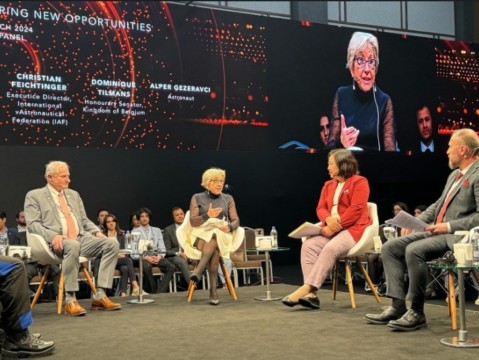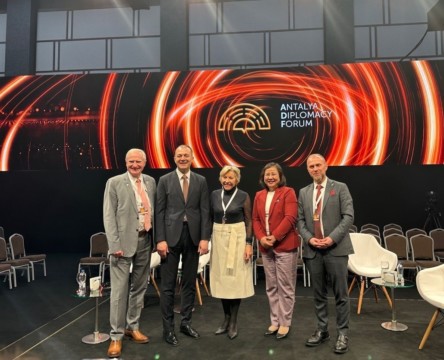The future of Space Diplomacy at the Antalya Diplomacy Forum 2024

Space diplomacy has always demonstrated to be a key instrument for understanding and managing the complexity of space cooperative projects in a fast-changing geopolitical context.
“As guardians of cooperation, international space organizations- large and small ones- are essential to share best practices on successful examples of synergism, to develop guidelines for the future of the sector, and to provide a platform to act collectively.”
Dominique Tilmans
Eurisy President, Dominique Tilmans recently attended the third edition of the Antalya Diplomacy Forum in Antalya, Turkey (March 1-3, 2024). With the theme “Advancing Diplomacy in Times of Turmoil”, the event gathered heads of states and governments, ministers, diplomats, business leaders, academics, think-tankers, youth, and media representatives for an all-encompassing debate about the future of international diplomacy, with specific attention also to the space sector.
As a speaker in the Panel “Space Diplomacy: Exploring New Opportunities” Ms. Tilmans had the opportunity to discuss the role of international space organizations in promoting dialogue and cooperation in the global space arena with experts and major representatives of the sector, and to present Eurisy mission and activities to bridge space and society.
Moderated by Dr. Ayhan İNCİRCİ the panel was composed by: Ms. Yu Qi, Secretary General, Asia-Pacific Space Cooperation Organization (APSCO); Dominique Tilmans, President at EURISY, Dr. Christian Feichtinger, Secretary General, International Astronautical Federation (IAF), Mr. Yusuf Kıraç, President, Turkish Space Agency (TUA), ad Mr Alper Gezeravcı, Turkey’s first astronaut, who joined the Axiom-3 mission to the International Space Station in January 2024. Several topics have been addressed during the session: from the growth of the investments in the space sector and the need for an increased access to funding among both established and emerging countries, to the challenges of young entrepreneurs to break down barriers to market in the sector as well as the opportunities offered. A strong focus was placed on the renewed interest in manned space missions, sparking conversations about how this will boost support and public involvement in future space exploration endeavours.
Several topics have been addressed during the session: from the growth of the investments in the space sector and the need for an increased access to funding among both established and emerging countries, to the challenges of young entrepreneurs to break down barriers to market in the sector as well as the opportunities offered. A strong focus was placed on the renewed interest in manned space missions, sparking conversations about how this will boost support and public involvement in future space exploration endeavours.
Ms. Tilmans emphasized the role of international space organizations, as core space diplomacy actors. She described how Eurisy managed for more than 35 years now to act as facilitator and matchmaker, enabling fruitful exchanges of best practices on the development and use of satellite applications, thus harnessing synergies of diverse ecosystems to profitably work together, increasing awareness and competitiveness of local communities. She also highlighted the role of Eurisy in stimulating the interest of young generations to discover hands-on the opportunities offered by the sector. Projects such as GIS4School and Geo-Academy as well the recently launched SpaceSuite have been on the spotlight to demonstrate the efforts of the association in supporting skills development, up and re-skilling, focusing on multidisciplinary education paths to establish and promote bridges between space and non-space sectors. Mr. Kıraç provided an overview of the national space strategy, acknowledging the growing interest of the country in space activities and events over the past few years, and encouraging students to seize the incredible untapped potential of this field and to actively participate in building its future. TUA President further emphasized the need to put education at the core of the future vision of the Turkish space sector. In support of this, he mentioned two examples of successful activities which last year gathered students and young professionals in events linked to space and technology in the country: TEKNOFEST, the aviation, space and technology festival, organized by the Turkish Technology Team Foundation (T3 Foundation) and the Turkish Ministry of Industry and Technology, as well as the Space Travelers Program, a collaboration between the Turkish Space Agency (TUA) and Space Camp Turkiye, which last year ensured to 100 students the possibility to participate in a fully immersive training in space technologies, an initiative poised to continue in the years to come.
Mr. Kıraç provided an overview of the national space strategy, acknowledging the growing interest of the country in space activities and events over the past few years, and encouraging students to seize the incredible untapped potential of this field and to actively participate in building its future. TUA President further emphasized the need to put education at the core of the future vision of the Turkish space sector. In support of this, he mentioned two examples of successful activities which last year gathered students and young professionals in events linked to space and technology in the country: TEKNOFEST, the aviation, space and technology festival, organized by the Turkish Technology Team Foundation (T3 Foundation) and the Turkish Ministry of Industry and Technology, as well as the Space Travelers Program, a collaboration between the Turkish Space Agency (TUA) and Space Camp Turkiye, which last year ensured to 100 students the possibility to participate in a fully immersive training in space technologies, an initiative poised to continue in the years to come.
The panel put space in the spotlight for dialogue and international relations, emphasizing how space diplomacy is also facilitating a broader conversation between emerging and established countries. It was emphasized the shift from a time when space activities were primarily dominated by “space-faring nations” to present, where this domain has evolved into a larger arena that fosters engagement and collaboration among a diverse range of countries. In this light, it has been recalled the discussion held at last year International Astronautical Congress, during a Symposium specifically dedicated to Emerging Space Ecosystems. Ms. Annalisa Donati, Eurisy Secretary General, as part of the IAF ACCESS Committee, actively contribute to this exchange, to strengthen connections and to establish a platform of cooperation to foster engagement, access, and entrepreneurship. With the entry of new countries and new actors into the space industry, transformative are the impacts on economic, political, and technological dynamics. It is thus crucial for international institutions and organizations to foster dialogue and partnership, not only among space actors but, as emphasized by Dominique Tilmans, to expand this vision to include non-space entities as well.
With the entry of new countries and new actors into the space industry, transformative are the impacts on economic, political, and technological dynamics. It is thus crucial for international institutions and organizations to foster dialogue and partnership, not only among space actors but, as emphasized by Dominique Tilmans, to expand this vision to include non-space entities as well.
“Our work at EURISY is to share and support engagement initiatives, truly acting as a bridge between organizations and societies, sharing both the capacity building opportunities in the sector, and the role space technologies have in contemporary societies.”
Dominique Tilmans
